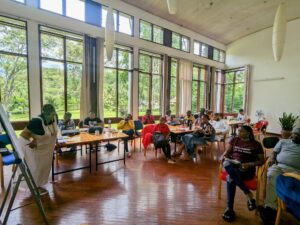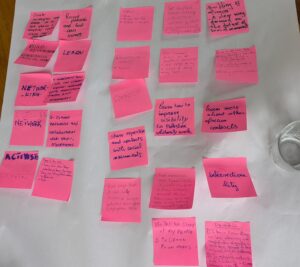Minds of the Movement
An ICNC blog on the people and power of civil resistance
by Rosie MoteneMarch 10, 2025
How has writing changed my life?

Sharing my passion for writing about activism. Arusha, December 2024. Credit: Amber French.
I had a very unconventional upbringing. I was born in 1974 in South Africa during the Apartheid era. At the time my mother was a domestic worker for a white Jewish family. The dynamics of being brought up through a white lens while my mother lived in the back room as the maid created many internal crises. The country, law and society reinforced the insolence that white is right, and for many decades I believed and adopted that internal racism; it was so inherent that I would pray at night asking G-d to tell me what to do so I could feel and be "normal".
I did not have the bravery to express these inner reflections through words, so I wrote down my secrets in my little diary, which had a cute gold lock on it. It was only in my thirties that I shared my writing with my then-therapist, which helped me heal and ultimately led me to publish my autobiography. Baring my soul to an external reader enlightened me about my strength and power. I soon began exploring more outward-facing writing and quickly realized the power within me.
Advocating for our rights

Writing helps us visualize and own up to our activism. Arusha, December 2024. Credit: Amber French.
On December 1, 2013, I was in Gaborone, Botswana attending a 16 Days of Activism event. A fight broke out at the venue and in the fracas, a punch landed on my nose, breaking it. When the local authorities refused to assist, my hosts took action and rushed me to the hospital, where the surgeon called the police station stating a case needed to be opened. The local authorities still refused. I called many people at home and in my global activist spaces. As it was the early hours of the morning, not much could be done. So, I wrote a post on all my social media pages, explaining what happened and asking for help. Through that, a local South African radio station called me, and I told my story. This caught the attention of the South Africa Department of International Relations and Cooperation (DIRCO). I was admitted to the hospital for observation and the next day, the police arrived to take my statement.
On my return to Johannesburg, I was admitted to a local hospital and underwent a rhinoplasty to mend my nose. During my healing phase, there was one comment from social media that was on my mind: "Women are beaten up every day. Why is it a big thing because it happened to Rosie Motene?"
It was that writing that urged me to get well and then take up the fight. The writing from other activists and feminist groups helped me reflect on the work needed in the sector. It helped me reflect on the reality that community and grassroots spaces are authentic safe spaces. Through all the attention, my government put pressure on Interpol and the perpetrator was called in. Through legal mediation, he apologized, took accountability for his actions and made a donation to a women's organization.
Sharing our truths, owning up to our activism
My voice and agency have always been loud, but that does not mean that it is seen or heard.
While working on my last TV set as an actor, the production team tried to force me into sex scenes, even I had declined this in my contract. The team ignored my concern about the high level of sexual harassment on set, and when I finally resigned from the production, I was not surprised that I was blacklisted. The shock to myself and others was that my activist voice was well established and the production team should have known where I would stand on such issues.
I used that ordeal to share my truths so that others who went through the same thing did not feel alone. Sharing this in the acting industry gave impetus for the creation of a secret network of survivors: many in the industry began contacting me in search of safe spaces to share their truths. It additionally catapulted me into documenting African feminist icons. In 2018, the South African entertainment industry tried again to silence me after I spoke out and wrote alongside other victims about a known perpetrator in the industry. I contacted the SA Commission of Gender Equality and lodged a complaint against an industry body and won. The reality is their power still upheld the embargo and ultimately forced me to close one of my businesses after a breakdown and other related illnesses.
But I still write about the truth.
Finding connections and common ground with others
Throughout my life, I've grown with writing, and writing has grown with me; it has been a gratifying and formidable journey. The process has led to further Pan-African synergies with feminist writers and groups. I have connected with other radical influences, such as Mona Eltahaway, the Egyptian journalist and activist who wrote: "I believe it's the writer's job to tell society what it pretends it doesn't know."
Our writing has been condemned and labeled vulgar, but our pens have not dried up. They can never erase our perseverance in our activism; let us continue to use the pen as a tactical weapon, a lesson, a refuge and a right!

Rosie Motene
Rosie Motene has a BA in Dramatic Arts from Wits University. She is an independent activist, feminist writer, and award-winning author. She has excelled as a global speaker, consultant, documentary, and impact producer.
Read More